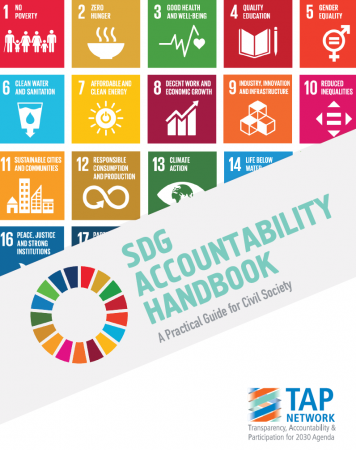ACTIONS
- Protect and safeguard cultural and natural heritage
- Learning and educational opportunities
- Cultural participation/social inclusion
- Sustainable tourism
- Support research
- Employment (recruiting, training, safety)
- Energy consumption, greenhouse gas emissions
- Waste management and reduction
- Transport (forms of, energy use)
- Commercial activities including copyright and IP
- Governance and management
- Security, disaster preparedness, risk reduction
- External partnerships and collaborations
- Toolkit/framework/roadmap
- Case studies
TAP Network: SDG Accountability Handbook: a practical guide for civil society

Intended Audience
“The Handbook is intended for use primarily by national or local level CSOs [civil society organisations], although it may also be used by a range of other actors seeking to promote accountability for the 2030 Agenda. For the purposes of the Handbook, CSOs include non-governmental organizations (NGOs), community-based organizations or groups, faith-based organizations, trade unions and professional associations, and civil society coalitions, networks and social movements.”
- TAP Network
“SDG Accountability Handbook: A Practical Guide for Civil Society seeks to support national-level civil society to help them hold their government accountable for commitments made in the 2030 Agenda for Sustainable Development (the 2030 Agenda), including the Sustainable Development Goals (SDGs). It aims to help civil society organizations (CSOs) better understand specific approaches to hold governments accountable for the SDGs, and to guide them through the practical steps they can take to improve accountability for the 2030 Agenda in their country.” (p.5)
Avaiable in
- English
SDGs LINKAGES
The focus of the resource is incorporating the SDGs into planning and corporate reporting, and providing effective communication on progress in addressing the SDGs. This is the focus of SDG target 12.6 (‘Encourage companies to adopt sustainable practices and sustainability reporting’), and ensuring effective access to information on progress on the SDGs also supports SDG 12.8 (ensure everyone has access to relevant information for sustainable development and lifestyles in harmony with nature). This also contributes to SDG 16.6 (‘Develop effective, accountable and transparent institutions at all levels’), 16.7 (participatory decision-making at all levels), 16.10 (on ensuring public access to information), 16.B (adopt and promote laws and policies for sustainable development) and 17.14 (policy coherence for sustainable development).
Click on the SDG Target to discover Our Collections Matter indicators
-
Our Collections Matter indicators:
- Clear visions, strategies and plans in place for all aspects of sustainability – environmental, social and economic (people, planet, prosperity)- across all areas of activity.
- Visions, strategies and plans relating to sustainability to be publicly available and incorporated into planning documents.
- Commitments to be in line with local, regional, national and/or international targets and ambitions.
- Incorporation of sustainability into reporting for funders and other stakeholders, including the public. Reporting to include commitments and progress towards targets.
-
Our Collections Matter indicators:
- Extent to which (i) global citizenship education and (ii) education for sustainable development (including climate change education) are mainstreamed in (a) national education policies; (b) curricula; (c) teacher education; and (d) student assessment.
- Extent to which global citizenship education and education for sustainable development (including climate change education) are mainstreamed in formal, informal and non-formal education programmes and activities drawing on and related to collections.
-
Our Collections Matter indicators:
- Proportion of the population [audience/users/non-users] satisfied with their last experience of public services.
- Access to information, and accountability policies and mechanisms, in place.
- Effective institutional arrangements, both for own working and for working in partnership with other sectors, in place.
- Plans and arrangements in place for extraordinary circumstances such as natural and human-caused disasters.
- Effective arrangements in place to fulfil legal and social obligations and responsibilities.
- Effective arrangements in place for transparent communication and reporting of institutional performance.
- Effective arrangements in place for transparent decision-making and accountability.
-
Our Collections Matter indicators:
- Proportions of positions (by sex, age, persons with disabilities and population groups) in public institutions (national and local legislatures, public service, and judiciary) compared to national distributions.
- Proportion of population [audience/users/non-users] who believe decision-making is inclusive and responsive, by sex, age, disability and population group.
- Decision-making addresses societal, environmental and economic challenges related to the community, considering short-term and long-term risks and opportunities.
- Decision-making draws on diverse backgrounds, viewpoints and interests, reflecting a broad base of stakeholders, and working to promote inclusion and provide effective services for all of society.
-
Our Collections Matter indicators:
- Adopt and implement constitutional, statutory and/or policy guarantees for public access to information.
- Plans in place, and plans implemented to enhance public access to information relating to collections.
- Plans in place, and plans implemented to support fundamental freedoms, in line with human rights, national and international agreements and legislation.
- Plans and procedures in place for public access to information relating to the operation and management of collections-based institutions.
- Complaint mechanism in place for public to use where public access to information and fundamental freedoms not supported or fulfilled.
-
Our Collections Matter indicators:
- Proportion of population [audience/users/non-users] reporting having personally felt discriminated against or harassed in the previous 12 months on the basis of a ground of discrimination prohibited under international human rights law.
- Number and proportion of policies that incorporate sustainable development considerations, in the full sense of recognizing all three of social, economic and environmental considerations.
-
Our Collections Matter indicators:
- Proportion of policies that incorporate sustainable development considerations, linking to SDGs and targets.
- Incorporation of policy considerations from outside the collections sector into policies of collections-based institutions, to facilitate partnerships and effectiveness.
